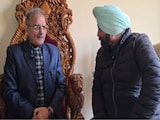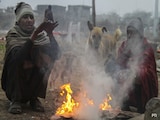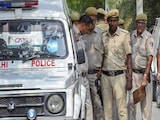It's all about privilege, how sexual encounters happen in high places and how victims have nowhere to go. Virginia Giuffre's posthumous book, Nobody's Girl, officially released on October 21, is the story of a girl who was nobody until she met Jeffrey Epstein and his associate Ghislaine Maxwell, and later Prince Andrew, the younger brother of King Charles of the United Kingdom. What she could not achieve in life she achieves in death: reveal all.
An Urdu poet once wrote, "Zabaan-e-tishna khamosh ho sakti hai, magar khoon apna fasaana nahi bhoolta", that is, "the thirsty tongue may fall silent, but blood remembers its story." It is often used to suggest that even in death, truth speaks through memory.
Or memoirs. Surely so is the case with Giuffre's Nobody's Girl. Even before its official release, it set the British Royal House on fire and marked one of its darkest days in recent history. Much of what she has written was already in the public domain, but she has added exact details, background and context the world was unaware of earlier.
The 367-page book is a memoir of surviving abuse and fighting for justice. But it's also a testimony to the fact that even the most privileged and protected men who indulged in abuses and exploitations cannot escape the ruin brought by a commoner. Giuffre, who allegedly took her own life in April, details her encounters with Epstein and Maxwell. But it is Giuffre's account of her alleged sexual encounters with Prince Andrew that has caused an uproar across the United Kingdom. Prince Andrew, of course, has denied all the allegations.
Giuffre writes that she had sex with Prince Andrew three times, including once during an "orgy" on Epstein's private island with eight other girls, many of whom she believed were under 18. She herself was barely 17 on one of the three occasions Prince Andrew slept with her, she alleges in the book.
Prince Andrew, the Duke of York, is the second son of the late Queen Elizabeth II and Prince Philip. He was married to Sarah Ferguson, the Duchess of York, and divorced in 1996. Their two daughters are Princess Beatrice and Princess Eugenie, both married. In the memoir, Giuffre outlines the pressure she claimed she faced from Prince Andrew's legal teams. She also suggests that some media organisations were afraid to cover her story due to fears of losing access to the Royal Family.
The King's brother has since relinquished his Duke of York title.
"He was friendly enough," Giuffre writes, "but still entitled - as if he believed having sex with me was his birthright."
The Explosive Revelations
The memoir lays bare Giuffre's tangled and traumatic relationship with Ghislaine Maxwell and Jeffrey Epstein - who died in a US prison in 2019 - and the Prince. It dives deep into the world they built - a world filled with wealth, predation and silent complicity, where a teenage girl's body became currency.
She writes that Maxwell told her, "Just like Cinderella, you're going to meet a handsome prince", before introducing her to Andrew for the first time in March 2001. The book says: "It was going to be a special day, she said. Just like Cinderella, I was going to meet a handsome prince. Her old friend Prince Andrew would be dining with us that night and we had lots to do to get me ready."
That "handsome prince" turned out to be the man now fighting to salvage what remains of his public reputation. Prince Andrew's image is in tatters.
Giuffre claims their first encounter took place at Maxwell's London townhouse, after a night out at Tramp nightclub - the evening immortalised by the now-infamous photograph of her standing beside Andrew, smiling, his arm casually around her waist. "I remember running for my Kodak FunSaver camera to snap the picture," she recalls, "because my mom would never forgive me if I met someone as famous as Prince Andrew and didn't pose for a picture."
In the book, she says Andrew guessed her age correctly: seventeen. "'My daughters are just a little younger than you,'" he told her, according to her account.
Their subsequent encounters, she writes, took place in Epstein's Manhattan townhouse and later on Little St James - the Caribbean island where Epstein hosted what Giuffre describes as an "orgy" with "approximately eight other young girls". "The other girls all appeared to be under the age of 18," she recalls. "Epstein laughed about how they couldn't really communicate, saying they are the easiest girls to get along with."
Denials, Legal Battle and Compromise
After years of denial, deflection and legal warfare, Giuffre alleges how the Prince's legal team allegedly tried to intimidate her and even hired internet trolls to harass her after their settlement. "We would never get a confession, of course," she writes. "That's what settlements are designed to avoid. But we were trying for the next best thing: a general acknowledgement of what I'd been through."
She recalls the night the settlement was finalised. "My lawyer read the duke's agreed statement at 2:30 a.m. Florida time - through tears, both hers and mine."
The memoir also recounts her reaction to Prince Andrew's infamous 2019 Newsnight interview - an event she describes as "an injection of jet fuel" for her legal team. In the interview, Andrew had insisted he had "no recollection" of ever meeting Giuffre and claimed he could not have been with her in March 2001 because he was at a Pizza Express in Woking with his daughter, Beatrice.
The arranged interview was meant to exonerate the Prince. Instead it sealed his downfall. "If we deposed the princesses," Giuffre wrote, "his family members could potentially poke holes in his alibi."
Giuffre describes watching the interview in disbelief - a man denying the undeniable, failing to show sympathy for Epstein's victims and clinging to implausible defences. The interview triggered global outrage and led to Andrew's withdrawal from public duties, followed by the eventual loss of his Duke of York title.
What stands out about Giuffre's memoir is that it doesn't merely recount the abuse but also exposes the system of silence that protected powerful, privileged men and shamed their victims into isolation. She writes that after Epstein's death in 2019, she felt cheated of justice. "This wasn't how justice was supposed to work out," she says. "He was supposed to face the women he had destroyed."
Even after his death, the spectre of Epstein obviously looms large in her narrative - a symbol of impunity. Maxwell, now serving a 20-year sentence for sex trafficking, features prominently in the book as the manipulator and recruiter who first enticed Giuffre. "She looked to be in her late thirties," Giuffre writes. "Her British accent reminded me of Mary Poppins." That genteel mask of refinement, Giuffre suggests, concealed the machinery of exploitation.
But amid the horror, there are flashes of determination - a woman's will to reclaim her story. In one of the book's most poignant moments, she writes of using her settlement not for revenge, but for redemption: "I look forward to disseminating some of the Crown's money to do some good."
She never discloses how much she was paid, though reports suggest the amount exceeded GBP 9 million - allegedly covered by the late Queen herself to protect the monarchy's dignity. "That his mother, the Queen of England, had footed the bill," she notes dryly, "was not lost on me."
The Same Old Story
We often wrongly believe that kings and princes, leaders and celebrities are meant to be models of virtue and righteousness. We do not expect them to indulge in soliciting for sex, entrapping young bodies in their grip and exploiting them like predators. Also, the #MeToo movement in India was, in its own way, a naked display of power and privilege by those in positions of authority. I wonder whatever happened to that movement.
Ultimately, the stories of the privileged and powerful - the toasts of the charmed circles - are often similar to those of the common people. Power rules. The vulnerable are exploited. There are always enough 'madams' and 'middlemen' springing up, like Maxwell and Epstein. It's a story that unfolds in any society, any city. I vividly recall, as a young reporter, writing about a 16-year-old girl in Delhi sold to a 'madam' by her greedy uncle and later rescued by police. Looking at her tender age and beauty, she was "served" only to the privileged, powerful customers. There aren't rewards for guessing what kind those privileged and powerful were.
Giuffre's voice, often silenced and often doubted, speaks through her pages with unsettling clarity. It is the voice of a woman wronged, scarred and yet unbroken. "In my mind," she writes in her closing passage, "I hold a picture of a girl reaching out for help and easily finding it. I picture a woman, too, who - having come to terms with her childhood pain - feels that it's within her power to take action against those who hurt her.
In the end, Virginia Giuffre's tongue was silenced when alive. In her death, her blood and her words remember their story.
(Syed Zubair Ahmed is a London-based senior Indian journalist with three decades of experience with the Western media)
Disclaimer: These are the personal opinions of the author















